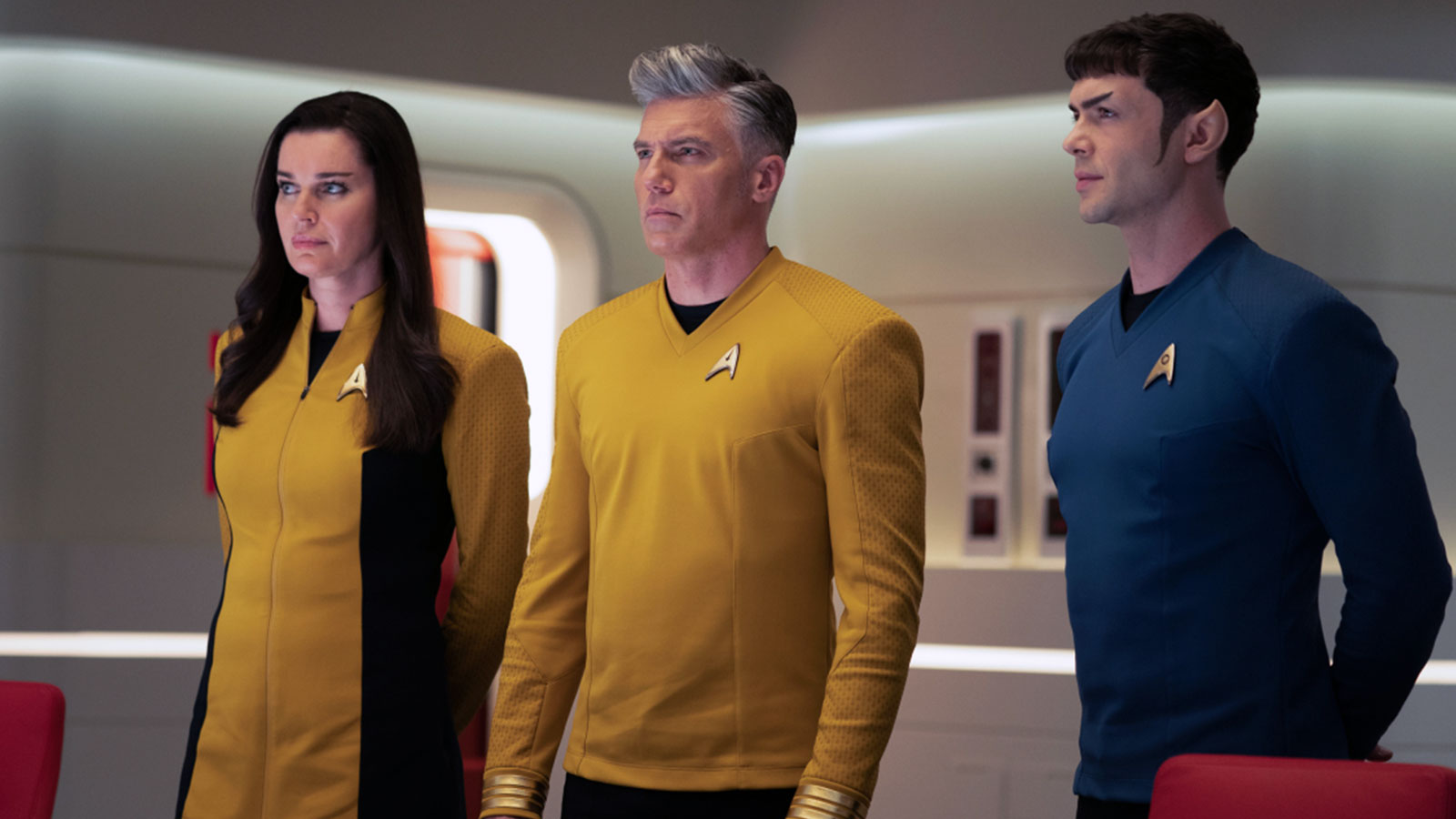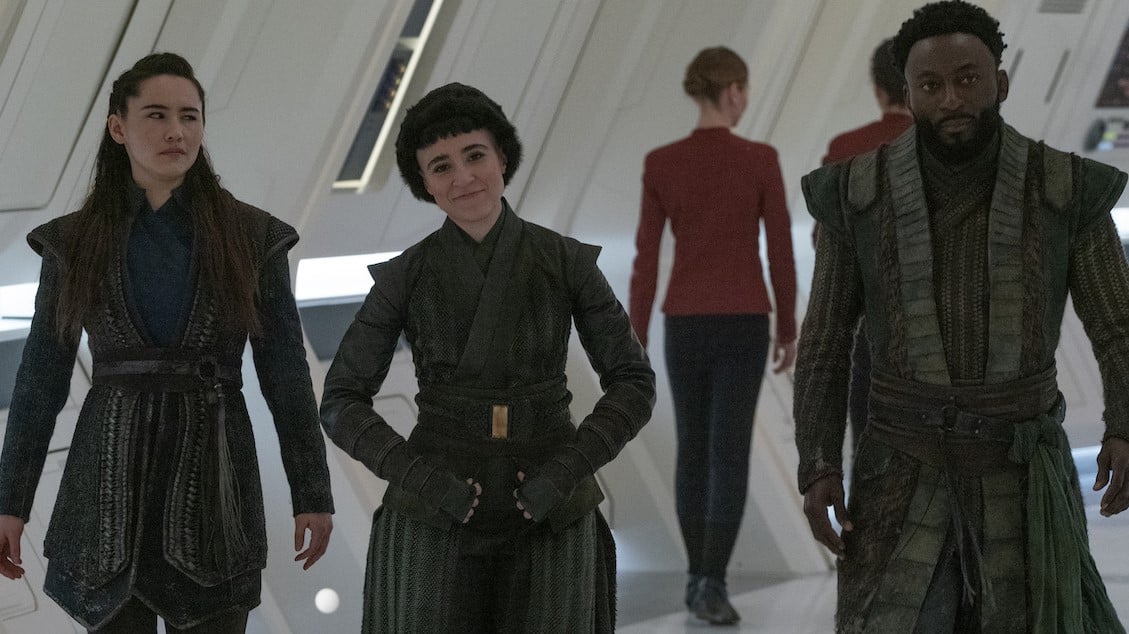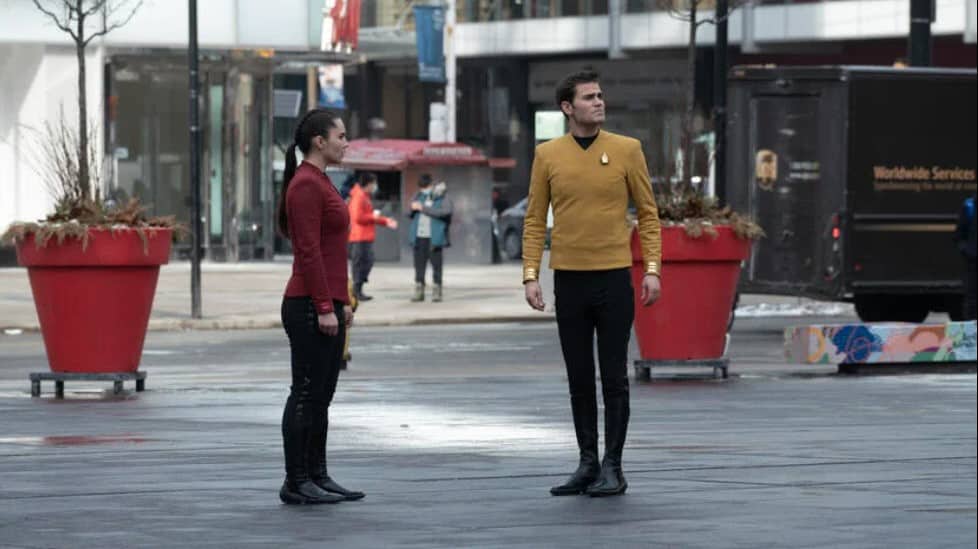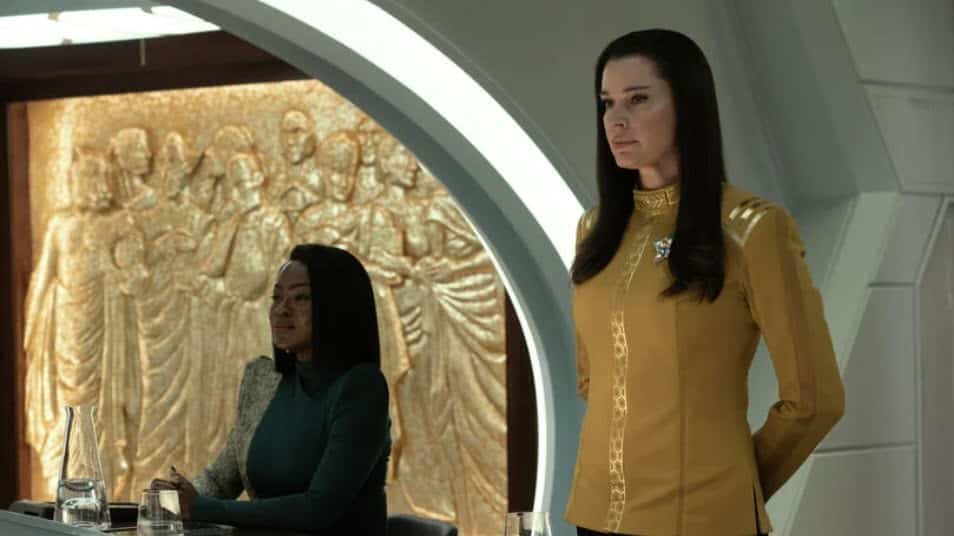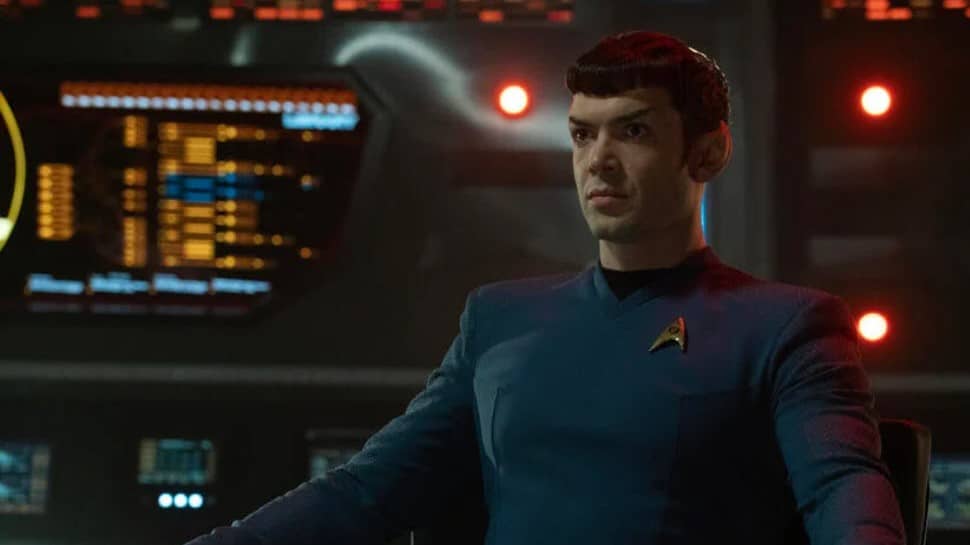In “Children of the Comet,” the Enterprise encounters a comet on a collision course with an inhabited planet, while cadet Uhura harbors doubts about her place in Starfleet. Written by Henry Alonso Myers & Sarah Tarkoff, directed by Maja Vrvilo.
Mark Turetsky: We’ve got our first “regular” episode of Strange New Worlds. It doesn’t have the burden of introducing us to the whole cast and setting up a status quo. Second episodes, in episodic television series, set the standard of “here’s what you can expect from week to week.” What did you think, Will?
Will Nevin: We can’t quite get to the point of wholly disconnected stories, can we? As much as I raved about Pike’s burden last time, I don’t know if that’s a thing that needs to be explored each and every week. That aside, this was a heck of an episode and certainly addressed one of our points last week — namely giving a character like Uhura something to do. She was a star, Marky Turtles.
Mark: If I recall correctly, Williamothy, it was you who referred to her presence on the series as “fan service.”
Will: The full quote was “fan service appendages.” Whoops.
A Long-Expected Party
Mark: The episode begins (well, after a clip of some aliens looking at a comet passing overhead), with Uhura on her way to dinner in the captain’s quarters. She meets up with Ortegas, who is dressed… aggressively casually, and has tricked Uhura into arriving in her dress uniform.
Will: It was better than showing up at the 9th green at 9, right? Sorry for the interruption.
Mark: It’s something that this era (and casting) affords: we know these characters, to a certain extent, but with a younger Uhura, she doesn’t need to be the fully-confident, got-her-shit-together version of the character we had in TOS and the movie series. But even in the first few minutes of this episode, we learn more about Uhura than we did in any of those previous appearances. She was always there, on the bridge, and that was a huge thing for the 60s, but she has never been the focus like she is here.
Will: The three Uhura moments I can recall are 1) she’s not to be fucked with (Search for Spock), 2) the dance of seduction (Final Frontier) and 3) being bad at the Klingon language (Undisovered Country). None of that is really character development — just moments where she got to shine (or, in the case of that last one, not so much).
Mark: I don’t even think we learned she was a master linguist until her appearance in the Kelvinverse films. It’s a good extrapolation from her being the communications officer, but it wasn’t something that was established about her. And we learn a lot about her background here, in a way that doesn’t feel like an infodump. A dinner in the captain’s quarters is inherently an uncomfortable situation, precisely because it’s the sort of place where the new kid will get singled out and grilled.
We also get to meet Hemmer for the first time. He’s an Aenar, a blind subspecies of Andorian that showed up in Enterprise. He continues in the tradition of blind engineers, but unlike LeVar Burton, Bruce Horak is legally blind. And instead of wearing a VISOR, Hemmer’s other senses compensate for his lack of sight. Andorians/Aenar, after all, have antennae, so I guess it makes sense (moreso than, say, Daredevil).
Will: I would feel better about that scene if I knew a disabled person had given it a sensitivity review — that “other senses compensate” trope is so tiresome, but at least it was Hemmer and Spock giving Uhura the business. I really enjoyed the dinner party scene in the captain’s amazing studio apartment. Although I wish him choking over the thought of Uhura in 10 years had been left as subtext rather than hammered home with the conversation with Number One later.
Mark: “i enjoying mysekf by the ribs, but then i remembered instances of training accident in my life, and pain i will have”


On the one hand, it’s getting to be his Big Thing, but on the other, it’s not the sort of thing he can just get over and move past. This episode also paints a very particular picture of Pike and Una’s relationship, with Una having been absent for much of the first episode. It really feels like she’s there co-hosting the dinner party. Not to mention that she sticks around and helps Pike out with cleanup. They seem more intimately domestic than other captain/first office duos we’ve had on Trek, don’t they?
Will: Kirk/Spock (see what I did there?) was somewhat distant in all but the moments it wasn’t on account of his Vulcan logic, and Picard/Riker…well, I’m not entirely sure how to characterize that relationship other than it was never a focus after the “I’m the first officer, and I’m not letting you beam down to the planet!” period of Riker’s one defining characteristic. I think the relationship here is different because Pike goes out of his way to be a leader — that’s why he has dinner with everyone, that’s why he’s chummy on the bridge, that’s why his future has him so troubled. This character — more than any other we’ve seen in a series — strives to build and nurture his crew.
Let me run a theory by you real quick: Having cadet Uhura spend a tour on board the Enterprise before presumably going back to the Academy is establishing the idea that this series will have at least one or two revolving door characters. And next season: Uhura is out, and that other Kirk is in.
Mark I like it, except that Celia Rose Gooding is doing such damn good work already. The scene she has with Spock after the dinner party, where Spock essentially tells her to get out of Starfleet and make room for someone who wants to be there, also really worked for me. If you’re aware of his sister, Michael Burnham, and their history together, it adds a lot to the exchange. In short, Michael was raised by Sarek and Amanda as Spock’s sister, and upon her graduation from the Vulcan Science Academy, she applied to be in the Vulcan Expeditionary fleet (not Starfleet). Sarek was told that the Vulcan fleet would accept either Spock or Burnham, but not both, and Sarek chose Spock. Spock chose to enlist in Starfleet, and so neither of his children joined the Vulcan fleet, despite Burnham’s wanting to join. So, through this lens, you can really see why Spock would tell Uhura to find somewhere else to go. But even if you’re not a viewer of Discovery, it doesn’t ring false. This Spock is still learning how to interact with humans, and might sometimes be insensitive and impolitic.
Will: I picked up on the mention of Spock mourning his sister last week. Also, it must have really chapped Sarek’s ass when Burnham was court martialed, huh? But going back to Uhura for a second, I got the sense that we’re putting together an Uhura/Spock/Chapel love triangle, which is an interesting way to bring together elements from different interpretations of this era.
Mark: Not to mention that nobody else seems to know about T’Pring, save perhaps Pike.
Will: It’s enough to make a lady real pissed off, Mark.
That’s Me On The Comet, That’s Me In The Spotlight, Losing My Lieutenant
Mark: The crew finds a comet that’s about to hit an inhabited, pre-industrial world. They try to blow it out of the sky, but it turns out to have shields: it’s not really a comet! It’s some kind of station or ship. Nurse Chapel injects the away team (Uhura, Spock, La’an and Sam Kirk) with anti-radiation medication. It really seems like this is Chapel’s role on the show, isn’t it? She also introduces a ticking clock: the drugs will only protect them for two hours, after which their internal organs will be liquefied. It’s a ticking clock that’s introduced, but never followed up on.

Will: That was a bit too much like last week’s DNA stuff — the comet’s impending collision was enough danger, so I don’t know why we had the radiation bit. Seems like that was just an excuse to get Chapel into the scene and kickstart that love triangle. But once we got on to the comet and found the mysterious pocket of breathable air (never a good sign, really), Sam Kirk ate it. And he ate it hard, Mark.
Mark: Those Kirk boys don’t have a reputation for being overly cautious.
Will: Would you consider Sam Kirk getting knocked the fuck out in his first major SNW appearance to be an Easter egg?
Mark: Well, if you’re familiar with “Operation — Annihilate!” then you know Sam Kirk has some plot armor. Speaking of: do you think there will come a point when Pike realizes that he has in-universe plot armor, that he’ll test just how predestined he is to have that accident, and therefore can’t die before then? Just something to think about.
Will: That’s the logical extension of his vision, right? If he really believes it — if he truly thinks there’s nothing he can do to avoid the chair — then he would absolutely risk death. But you gotta think — as both Una and Sarah Connor said — “There is no fate but what we make.” Something is going to happen this season (series?) to make Pike think it’s not 100 percent locked in.
Mark: What happens to Star Trek, as a franchise, if he pushes things too far and gets himself killed? Anyway, that’s a bit of a detour. One plus of Sam Kirk getting zapped, they get to remove their helmets. Seriously, the in-helmet lighting is very unflattering to everyone. I only really put it together on my second viewing, but the comet is clearly making use of the show’s Mandalorian-style virtual set. It’s put to some really great use here, as the comet gives them a technological light show when Uhura tries to communicate with it. Aside from the impressive giant metallic egg-thing, there’s not all that much to the set, but it doesn’t feel cheap, or like they’re cutting any corners. It just looks great.
Will: We’ve come a long way from Planet Hell and matte paintings, my friend. The first season of Picard felt low budget, in some cases embarrassingly so. And while the second season got away from that cheapness a bit, nothing has felt quite so grand as what we see here. The Enterprise sets are beautiful. The comet was a great light show. I will say, though, that it felt a bit on the cheap side to continue to cut to the same family on the planet surface when Pike and crew are trying to save “billions.” Just say the planet is sparsely inhabited!
Mark: Discovery recently did a “translate a non-verbal alien language against a ticking clock” episode, but that’s just about where the similarities of the two stories end. This one felt very Close Encounters with the alien music. It did give me some shivers, though, seeing Uhura and Spock humming music together. They’re not close friends at this point, but it’s foreshadows this lovely (except for Charlie Evans, what a creep!) scene from TOS’ “Charlie X.
Again, if you know about this scene, it adds to the moment. If you don’t know about it, the scene still works.
Will: I thought Spock was a bit flat m’self, but it was a nice scene nevertheless.
Mark: That’s why he switched to the Vulcan lute by the time of the Original Series.
Will: Although we may have gone a bit too far down the path of Uhura being able to communicate with the comet, because that’s what I assumed was going to be the planet’s salvation in the final act. And, hey, not for nothing, the show’s writers are probably right on the idea that aliens would use musical notes much in the same way we do. It’s all math. How cool is that?
Mark: I’m not personally musically trained, but my spouse is, and she didn’t shout “bullshit!” while we watched it. So I’ll take it as a tacit endorsement.
They’re Making The Comet Spew Ice, It’s Scarred!
Mark: But getting back to Uhura’s linguistic prowess not saving the day, it felt a bit less satisfying for me, from a narrative standpoint. Yes, her skills get them off the comet, but it’s Spock’s ace shuttlecraft flying that ultimately saves the planet. It’s not bad per se, but that resolution comes from way out in left field.

Will: It doesn’t help that the plan was hatched off-screen. Made for an ultimately confusing homestretch.
Mark: Yes, and Uhura isn’t even involved in the plan at all. Look, I get that she’s a cadet, and comet salvation isn’t her bailiwick, and if she does everything all at once she moves into Wesley Crusher territory, but again, it’s not narratively satisfying for her to take such a backseat in the final act.
Will: Since we haven’t talked about them anywhere else, what did you think of the Shepherds/”space monks”? To me, they were a useful foil for Pike both narratively and thematically.
Mark: We found out on Discovery that Pike’s father was a science teacher who also taught comparative religion, which led to a lot of disagreements between them. But when the Sherherds of M’hanit (as they call the comet) are so formidably armed, you have to at least pretend to take their faith seriously, don’t you? But of course, by the end, the Shepherds are proven somewhat wrong by Uhura: M’hanit does have some kind of precognition, perhaps even consciousness, but it also depends on some kind of interference, which the Shepherds were willing to destroy the Enterprise over.
Will: Faith is a powerful tool; the Shepherds themselves said they no longer remembered why they do what they do. Rather, it’s their belief in M’hanit that compels them. And as we’ve seen throughout history, you don’t want to place yourself between an ardent believer and their article of faith. Pike took an awful big risk in sending Spock, but that’s the responsibility of command, isn’t it?
Mark: Pike’s bluffing the Shepherds really put me in mind of Kirk, but then I got to thinking: what if he felt comfortable bluffing them because he knows he won’t be killed here? It’s never made explicit (I get the feeling if he told Una or his personal log about his motivations, he’d get removed from duty, because “I knew they wouldn’t blow us up because I’ve had a vision of the future” sounds delusional and dangerous), but maybe it’s there?
Will: I feel like every TNG episode to deal with this question brushed it off in exactly the same way: All we can do is go straight ahead. So in “Cause and Effect,” for example, instead of coming to a dead stop or reversing course or literally doing anything else but steaming right ahead into the temporal causality loop, the Enterprise keeps doing the same thing rather than strategizing against what appears to be fate. For Pike, maybe the answer is different — maybe he does lean into this “plot-based armor.”
Mark: So in the end, M’hanit injects a huge amount of water into the planet’s atmosphere, which will make the planet more suitable for agriculture and ruin the lives of the hunter/gatherers who live there now. But M’hanit will M’hanit, am I right?
Will: M’hanit’s will be done, Mark. But it’s worth considering: Both the Enterprise and the comet were ready to intervene in the development of the planet. Only the Shepherds were going to abide by a principle of non-interference.
Mark: It’s like Pike says: they won’t interfere, but they also won’t sit by when there’s a preventable catastrophe.
Will: Who’s to say what’s preventable? Sounds like a squishy standard to me. Almost like the Federation needs some general standing order to address the situation. I’m clearly giving you the business, but this show continues to engage with metaphysical questions in the finest of Trek traditions.
Stray New Words
- Fun fact with our focus on Uhura this week: Nicholas Meyer — the writer responsible for Wrath of Khan, Voyage Home, Undiscovered Country and the first season of Discovery (before he “was not invited back” for the second season) — was so tone deaf as to the impact of the racial themes in his Undiscovered Country script that he made both Nichelle Nichols and Brock Peters (Admiral Cartwright) uncomfortable. Nichols specifically refused to say the line “Guess who’s coming to dinner,” an intentional reference to the film of the same name.
- Nichols also refused to say, “Yeah, but would you let your daughter marry one of them?”. What the fuck, Meyer?
- The dress uniforms seem to presage the patterns of TNG/DS9/VOY uniforms.
- They should also look plenty familiar to Star Trek Online players.
- The away team certainly got out of their space suits and into their uniforms really quickly, huh?
- I guess Starfleet captains can just look up information on any private Federation citizens they want, huh? Maybe it’s stuff from their parents’ social media account.

